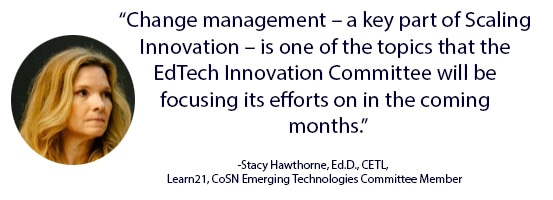During the EdTech Innovation Committee’s December joint meeting with the Driving K-12 Innovation Advisory Board, one theme that was heard often throughout the brainstorming process was a need to address Scaling Innovation & Inertia of Education Systems, a Hurdle (obstacle) in this year’s Top Topics. Change management – a key part of Scaling Innovation – is one of the topics that the EdTech Innovation Committee will be focusing its efforts on in the coming months.
In an era when education needs and tools are rapidly evolving, the inertia that can characterize our education systems really can be a significant barrier. There are people doing great things, but scaling those innovations effectively across schools, districts, and even countries is hard.
Why Change Management Is Central to Scaling Innovation
To make progress on the Hurdle of Scaling Innovation & Inertia of Education Systems, change management is essential. It’s the bridge between new ideas and successful implementations at a larger scale. 
A few reasons why change management is necessary:
- Educational institutions are complex ecosystems with deep-rooted traditions and practices. Introducing new ideas and approaches requires more than just a good concept; it necessitates a strategic plan for integrating these changes into the existing fabric of our schools.
- Without proper change management, even the most brilliant innovations can falter. We’ve likely all seen instances where lack of buy-in, resistance to change, or inadequate training leads to the failure of promising initiatives. Change management addresses these hurdles head-on. It involves preparing, equipping, and supporting individuals to successfully adopt change. This process ensures that the innovation is not just introduced but is also embraced and sustained.
- Effective change management fosters a culture of adaptability and flexibility – qualities that are essential in today’s fast-paced educational landscape. By encouraging these traits, we prepare our educators and students to be more receptive to change, making the adoption of future innovations smoother and more successful.
- Change management promotes collaboration and communication, essential ingredients for scaling innovation. It creates channels for feedback, learning, and continuous improvement. This way, innovations can be adapted and refined to meet the diverse needs of different schools and communities.
Supporting change management is not just about managing the introduction of new ideas; it’s about transforming our educational systems into dynamic, responsive entities capable of evolving with the times. It’s about making sure that the innovations we introduce today can grow, adapt, and flourish tomorrow. It’s a key solution to a major Hurdle identified by the K-12 Driving Innovation Advisory Board. Additionally, by tackling Scaling Innovation & Inertia of Education Systems using effective change management, you are directly building the Human Capacity of Leaders (an Accelerator, or catalyst, in the 2024 Top Topics).

Moving Forward
It was clear in the EdTech Innovation Committee’s rich discussion this month that not only is this topic important, but it is also urgently needed in today’s school systems.
Over the next few months, the committee will focus its efforts on this specific challenge of change management and scaling and sustaining innovation, providing case studies, action-oriented advice to support fellow education leaders in this work.
Resources & Tools to Help Implement Change Management in Schools
To get started, here are some resources to assist in the change management process, which will, in turn, promote scaling innovation:
- The framework of essential skills of the K-12 CTO from CoSN
- Designing for scale: A worksheet for developing a scaling strategy in education from Brookings (2021)
- Promoting Educational Innovations and Change through Networks between Higher Education Teachers from Tertiary Education and Management Journal (2022)
- Change Management in K-12: What You Need to Know from Frontline Education (n.d.)
- Change Management in K-12: Six Change Management Models for K-12 from Frontline Education (n.d.)
- Managing change in education – Practical strategies to improve change outcomes in K-12 from RTI International (2019)
- Microsoft K-12 Education Transformation Framework from Microsoft (n.d.)
Author: Stacy Hawthorne, Ed.D., CETL, Learn21, CoSN Emerging Technologies Committee Member
Published on: Feb 13, 2024
CoSN is vendor neutral and does not endorse products or services. Any mention of a specific solution is for contextual purposes.


